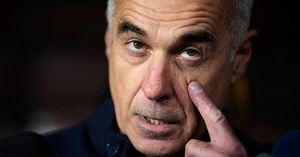Recent developments surrounding U.S. tariffs on Canadian goods have sparked significant concern among Canadian politicians and industry leaders, particularly those within British Columbia's lumber and forestry sectors. British Columbia Premier David Eby has explicitly stated his fears, labeling the potential 25 percent tariffs being threatened by U.S. President-elect Donald Trump as "devastated" for the province's economy.
Eby’s warnings come at a pivotal time, as he prepares to engage with Prime Minister Justin Trudeau and other provincial leaders to discuss the looming tariffs. During this virtual meeting, scheduled after Trump publicly announced his intention on social media, Eby emphasized the unjustified nature of the tariffs and predicted they would adversely affect both American and Canadian economies.
Under the current circumstances, Eby pointed out, the local lumber and forestry industries are already grappling with increased duties related to a longstanding dispute over softwood lumber with the U.S. He expressed skepticism about the logic behind the tariffs, arguing they would lead to more expensive construction materials, thereby increasing housing prices for U.S. consumers.
“It’s going to result in more expensive wood for building homes and buildings,” Eby said. “That doesn’t make any sense.” He underscored the importance of B.C. as a supplier of not only wood products but also natural gas and minerals, all of which are integral to various U.S. businesses. According to Eby, imposing tariffs would hinder job creation and economic opportunities within B.C. and lead to higher costs for American consumers.
The Premier's sentiments were echoed by economist Torsten Jaccard from the University of British Columbia. He cautioned about Canada’s vulnerability, with exports to the U.S. accounting for approximately 20 percent of the country's income. “If those tariffs were to come place, I think it’s fair to say the results would be quite devastating for the Canadian economy,” he stated.
During the meeting, Deputy Prime Minister Chrystia Freeland reinforced the urgency for unity among provinces, as disparate political landscapes could hinder collective negotiations with the incoming U.S. administration. Although some provincial leaders like Ontario’s Doug Ford suggested the federal government has been slow to respond, others, such as Alberta’s Danielle Smith, reiterated the need to address border security concerns stemming from accusations of illegal crossings and drug trafficking.
“These unjustified tariffs do threaten the prosperity and security of many families in our province,” Eby warned, reflecting the sentiments of many industry professionals, including Marty Warren, the Canadian national director for the United Steelworkers union. Warren described the Quebec-based forestry sector, primarily reliant on the B.C. lumber market, as already suffering from diminished capacity due to existing duties. He posited the dire predictions of mill closures and job losses if tariffs escalate.
Eby stressed the necessity for provincial officials to advocate for the lumber industry actively. He noted the importance of diversifying trading partners, highlighting efforts previously made to strengthen ties with countries such as Japan, Korea, and Singapore. These relationships could provide B.C. businesses with alternative markets, mitigating the impacts of U.S. tariffs.
B.C. is often characterized as facing different challenges compared to other provinces like Ontario and Quebec, due to its unique economic ties and reliance on lumber exports. Nonetheless, Eby affirmed his determination to present B.C.'s case vigorously during negotiations, aiming for a unified front across Canada against Trump’s tariff threats.
With governmental responses still developing, it remains to be seen how these discussions and strategies will play out. But for now, the lumber and forestry sectors, along with their local communities, stand at the precipice of uncertainty as they brace for what could be another turbulent chapter in U.S.-Canada trade relations. The ramifications of these tariffs threaten to echo through both economies, propelling major policy discussions and strategic planning at the national and provincial levels.
Opinion remains divided among political leaders, with some acknowledging the necessity to tackle border security concerns directly, adhering to Trump’s demands, whereas others firmly believe tariffs are unwarranted, regardless of any alleged illegal activities at the border. This brewing conflict could shape not just economic relationships, but political alliances as Canada prepares for more high-stakes negotiations following the inauguration of President Trump.
B.C. Premier Eby’s earnest plea for cooperation resonates beyond provincial lines, as he grasps the severity of the potential fallout and highlights the interconnectedness of economies along the North American continent. With many industries on edge, the call for coordinated action has never been more pronounced.
Moving forward, British Columbia must tread carefully. Employing thoughtful, proactive measures could assist local businesses and protect job security within the province, as it prepares to respond to external pressures from the U.S. administration. The next few months will be pivotal, as both Canadians and Americans navigate the uncertain waters stirred by proposed tariffs.



